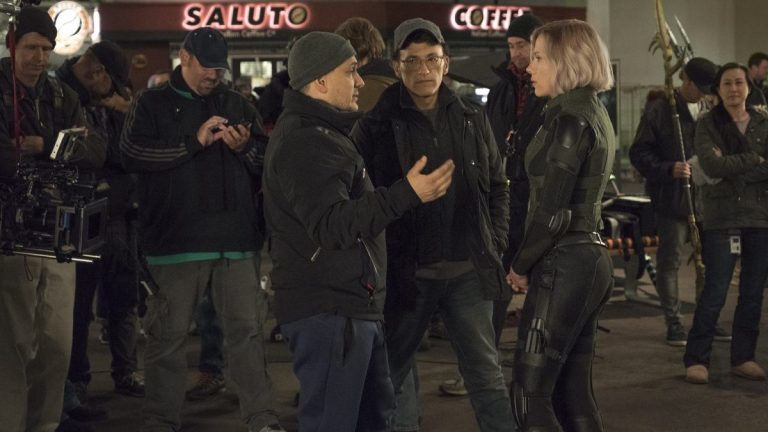Marvel Director: Disney’s Treatment of Scarlett Johansson Was ‘Disturbing’
Exclusive: After being reported as unhappy with Disney’s treatment of Scarlett Johansson last year, one of the Russo Brothers opens up about the lessons learned from the Black Widow Disney+ rollout.

When Scarlett Johansson’s long-awaited solo Black Widow movie finally reached theaters in June 2021, it was expected to be both the culmination of her decade-plus work with Marvel Studios and the biggest film of that summer. Before this moment, Johansson had worked with the superhero dream factory since 2010’s Iron Man 2, and yet by the time her character reached a narrative conclusion in the Russo Brothers-directed Avengers: Endgame (2019), Natasha Romanoff remained the only major Avenger without a solo movie.
So Black Widow finally rectified that when it was slated to be both Marvel and Disney’s biggest spectacle at the cinema that summer. And technically, it was, opening with $80.4 million domestic in its first weekend, the biggest of any film during the pandemic up to that point. And yet, it also was notably a lot less than other Marvel movies starring one of the core Avengers characters—films like Thor: Ragnarok, which opened at $122.8 million and even Captain America: The Winter Soldier from seven years earlier, which opened at $95 million while being marketed with Johansson as a co-lead. The pandemic probably played a role in this, but the obviously larger factor was Disney releasing the movie day-and-date behind a paywall on Disney+—a paywall the company initially bragged generated $60 million in that same weekend, and of which Johansson nor any of the other talent initially saw any backend of. That is significant since the Disney+ release (and the HD pirating it invited) more than likely cut substantially into Black Widow’s box office.
In the end, the movie dropped a disastrous 68 percent in its second weekend and wound up earning less overall than the more obscure Shang-Chi, which like all other subsequent MCU movies opened exclusively in theaters (and during a far less friendly time for audiences during the Delta variant scare last fall). Hence Johansson’s now famous suit against Disney for releasing Black Widow on streaming after the star had allegedly extracted “a promise from Marvel that the release of the picture would be a theatrical release.” Johansson’s legal team asserted that she should have received a similar backend deal on those touted $60 million (and counting) Disney+ revenues.
The lawsuit was eventually settled out of court but not before things got ugly in the press with a Disney spokesperson stating Johansson had a “callous disregard” for public health due to the COVID-19 pandemic. And while matters might be settled now, other Hollywood talent was aggravated then, including Johansson’s frequent Marvel directors, Joe and Anthony Russo. That was at least the rumor when the Wall Street Journal published without cited sources that the Russos were so upset by Disney’s treatment of Johansson that they came to an “impasse” while reportedly negotiating a return to Marvel.
Eight months later, the Russo Brothers are now about to release their latest film, a spy action epic for Netflix called The Gray Man, and while sitting down to discuss the project with Den of Geek, Joe Russo went on record about his thoughts on Disney’s treatment of Johansson and what lessons can be learned from it.
“We’re certainly concerned with the trend in the market that’s moving away from artists,” Russo says. “There’s been a lot of value in tech companies getting involved in making content, but there’s also some downsides to that. And those downsides include tech companies like Netflix and Apple and Amazon having much deeper pockets than studios do, and they can pay more and that’s starting to scare the studios.”
It is this fear that Russo considers a driving motivation for studios to misunderstand or devalue creative talent.
Says Russo, “So the studios are having a conservative reaction, and they’re trying to downplay their need for stars. They’re trying to force IP to be their star, and in accordance with that they’re also then trying to underpay and diminish the need for stars on their projects.”
He goes on to add, “That was really not an appropriate way for them to handle that situation. It was disturbing to us as artists. Scarlett is a good friend of ours, and we were disheartened by how it was handled. We’re glad it’s resolved.”
Russo declines to comment on whether they were actively in discussions about returning to Marvel Studios at that time, but as he also points out he and his brother have been incredibly busy setting up their own production company at AGBO that in addition to producing their own movies is also spending on smaller independent passion projects, such as the indie hit of this spring, the Daniels’ Everything Everywhere All at Once.
“Our autonomy is at a historic scale,” Russo explains. “We have our own company, it’s really well-funded, and we can help movies like Everything Everywhere All at Once get across the finish line.”
It is perhaps success stories like that which also gives Russo the confidence to foresee a future for moviemaking that doesn’t look quite as franchise-driven as some might expect.
“I think we will start trending back towards original IP,” Russo says. “I think it’s a great opportunity… I think that original IP will start to emerge in this market as corporations become more pedantic and factory-like with the execution of their current IP. I just think people are going to crave new ideas.”
The Gray Man opens in theaters on July 15 and on Netflix on July 22.
